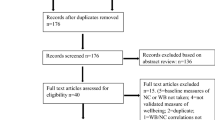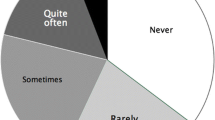Abstract
This study examines relationships between three central human concepts. From national probability samples of adults in the United States and in Singapore, we measured happiness, materialism (operationalized as the three sub-scales of possession-defined success, acquisition centrality, and acquisition as the pursuit of happiness), and religious experience (using three scales measuring intrinsic religiosity, extrinsic religiosity, and religion as quest). It was expected and found that happiness is negatively related to overall materialism in both the US and in Singapore, although happiness" relationship with the three materialism sub-scales was mixed. We observed that adults in Singapore are less happy and more materialistic than those in the US It was expected that happiness would have a positive relationship with intrinsic religiosity and extrinsic religiosity, but a negative relationship with religion as quest. Though our results largely support these hypotheses, they produce some unexpected differences between the two countries and across the three religiosity dimensions. We conclude that happiness is not associated with people's material accumulation but with their perceived inner world. And happy people see their religion not so much as something they “do” as what they “are”.
Similar content being viewed by others
REFERENCES
Allport G.W.: 1950, The individual and his religion: A psychological interpretation (Macmillan, New York).
Allport G.W. and J.M. Ross: 1967, 'Personal religious orientation and prejudice', Journal of Personality and Social Psychology 5, pp. 423–443.
Andrews F.M. and J.P. Robinson: 1991, 'Measures of subjective well-being', in J.P. Robinson, P. Shaver and L. Wrightsman (eds.), Measures of Personality and Social Psychological Attitudes (Academic Press, San Diego).
Andrews F.M. and S.B. Withey: 1976, Social Indicators of Well-Being: Americans' Perceptions of Life Quality (Plenum, New York).
Batson C.D.: 1976 'Religion as Prosocial: Agent or Double Agent?', Journal for the Scientific Study of Religion 15(1), pp. 29–45.
Batson C.D. and P.A. Schoenrade: 1991a, 'Measuring Religion as Quest: 1) Validity Concerns', Journal for the Scientific Study of Religion 30(4), pp. 416–429.
Batson C.D. and P.A. Schoenrade: 1991b, 'Measuring Religion as Quest: 2) Reliability Concerns', Journal for the Scientific Study of Religion 30(4), pp. 430–447.
Batson C.D. and W.L. Ventis: 1982, The Religious Experience: A Socialpsychological Perspective (Oxford University Press, New York).
Belk R.W.: 1985, 'Materialism: Trait Aspects of Living in the MaterialWorld', Journal of Consumer Research 12, pp. 265–279.
Belk R.W.: 1988, 'ThirdWorld Consumer Culture', Research in Marketing, Suppl. 4, pp. 113–127.
Belk R.W.: 1995, 'Hyperreality and Globalization: Culture in the Age of Ronald McDonald', Journal of International Consumer Marketing 8.
Bulman R.J. and C.B. Wortman: 1977, 'Attributions of Blame and Coping in the 'RealWorld': Severe Accident Victims React to Their Lot', Journal of Personality and Social Psychology 35, pp. 351–361.
Campbell A.: 1976, 'Subjective Measures of Well-Being', American Psychologist, February, pp. 117–124.
Campbell A., P.E. Converse, and W.L. Rodgers: 1976, The Quality of American Life (Russell Sage Foundation, New York).
Campbell C.: 1987, The Romantic Ethic and the Spirit of Modern Consumerism (Basil Blackwell, New York).
Chamberlain K. and S. Zika: 1988, 'Religiosity, Life Meaning andWellbeing: Some Relationships in a Sample of Women', Journal for the Scientific Study of Religion 27, pp. 411–420.
Gorsuch R.L. and C.S. Smith: 1983, 'Attribution of responsibility to god: An interaction of religious beliefs and outcomes', Journal for the Scientific Study of Religion 22, pp. 340–352.
Daun A.: 1983, 'The Materialistic Life-Style: Some Socio-psychological Aspects', in Liisa Uusitalo (ed.), Consumer Behavior and Environmental Quality (St Martin's, New York), pp. 6–16.
Delener N.: 1994, 'Religious contrast in consumer decision behavior patterns: Their Dimensions and marketing implications', European Journal of Marketing 28(5), pp. 36–53.
Diener E.: 1984, 'Subjective well-being', Psychological Bulletin 95, pp. 542–575.
Diener E.: 1993, 'Assessing subjective well-being: Progress and opportunities', Social Indicators Research 31, pp. 103–157.
Donahue M.J.: 1985, 'Intrinsic and extrinsic religiousness: Review and metaanalysis', Journal of personality and social psychology 48, pp. 400–419.
Ellison C.G.: 1991, 'Religious involvement and subjective well-being', Journal of Health and Social Behavior 32 (March), pp. 80–99.
Ellison C.G., D.A. Gay and T.A. Glass: 1989 'Does religious commitment contribute to individual life satisfaction?', Social Forces 68(1), pp. 100–123.
Fromm, E.: 1976, To Have or To Be? (Harper & Row, New York).
Hadaway C.K.: 1978, 'Life satisfaction and religion: A reanalysis', Social Forces 57(2), pp. 636–643.
Hadaway C.K. and W.C. Roof: 1978, 'Religious commitment and the quality of life in American society', Review of Religious Research 19, pp. 295–307.
Haerich P.: 1992, 'Premarital sexual permissiveness and the religious orientation: A Preliminary investigation', Journal for the Scientific Study of Religion 31, pp. 361–365.
Hunsberger B.: 1985, 'Religion, age, life satisfaction, and perceived sources of religiousness: A study of older persons', Journal of Gerontology 40, pp. 615–620.
Inglehart R.: 1981, 'Post-materialism in an environment of insecurity', American Political Science Review 75, pp. 880–900.
James W.: 1902/1958, TheVarieties of Religious Experience (NewAmerican Library, New York).
King M.B.: 1967, 'Measuring the religious variable: nine proposed dimensions', Journal for Scientific Study of Religion 6, pp. 173–193.
King M.B. and R.A. Hunt: 1969, 'Measuring the religious variable: amended findings', Journal for Scientific Study of Religion 8, pp. 321–323.
Kojetin B.A., D.N. McIntosh, R.A. Bridges and B. Spilka: 1987, 'Quest: Constructive search or religious conflict?', Journal for the Scientific Study of Religion 26(1), pp. 111–115.
LaBarbera P.A. and Z. Gurhan: 1997, 'The role of materialism, religiosity, and demographics in subjective well-being', Psychology and Marketing 14(1), pp. 71–97.
Mason R.S.: 1981, Conspicuous Consumption: A Study of Exceptional Consumer Behavior (Gower, Westmead).
Mattelart A.: 1989/1991, Advertising International: The Privatisation of Public Space (M. Chanan, trans.) (Routledge, London).
McFarland S.G.: 1989, 'Religious orientations and the targets of discrimination', Journal for the Scientific Study of Religion 28, pp. 324–336.
Moschis G.P. and G.A. Churchill: 1978, 'Consumer socialization: A theoretical and empirical analysis', Journal of Consumer Research 15, pp. 599–609.
Mukerji C.: 1983, From Graven Images: Patterns of Modern Materialism (Columbia University Press, New York).
Myers D.C. and E. Diener: 1995, 'Who is happy?', Psychological Science 6(1), pp. 10–19.
Nunnally J.C.: 1978, Psychometric theory. 2nd ed. (McGraw-Hill, New York).
Pargament K.L. and J. Hahn: 1986, 'God and the just world: Causal and coping attributions to god in health situation', Journal for the Scientific Study of Religion 25, pp. 193–207.
Polanyi K.: 1944, The Great Transformation (Rinehart, New York).
Pollner M.: 1989, 'Divine relations, social relations, and well-being', Journal of Health and Social Behavior 30, pp. 92–104.
Poloma M.M. and B.F. Pendleton: 1988, 'Religious domains and general well-being', Social Indicators Research 22, pp. 255–276.
Rassuli K.M. and S.C. Hollander: 1986, 'Desire – induced, innate, insatiable?', Journal of Marcomarketing 6, pp. 4–24.
Richins M.L.: 1987, 'Media, materialism, and human happiness', Advances in Consumer Research 14, pp. 352–356.
Richins M.L. and S. Dawson: 1990, “Measuring material values:Apreliminary report on scale development,” in Marvin E. Goldberg, Gerald Gorn, and RichardW. Pollay, (eds.), Advances in Consumer Research, vol. 17 (The Association for Consumer Research, Provo, UT), pp. 352–356.
Richins M.L. and S. Dawson: 1992, 'A consumer values orientation for materialism and its measurement: Scale development and validation,' Journal of Consumer Research 19, pp. 303–316.
Sahlins M.: 1976, Culture and Practical Reason (University of Chicago Press, Chicago).
Sirgy M.J.: 1998, 'Materialism and quality of life', Social Indicators Research 43, pp. 227–260.
Spilka B. and G. Schmidt: 1983, 'General attribution theory for the psychology of religion: The influence of event-character on attributions to god', Journal for the Scientific Study of Religion 22, pp. 326–339.
Thomas L.E. and S.A. Eisenhandler (eds.): 1994, Aging and the Religious Dimension (Auburn House, London).
Veenhoven R.: 1984, Conditions of Happiness (Kluwer Academic, Dordrecht, Netherlands).
Veenhoven R.: 1995, 'Developments in satisfaction research,' Social Indicators Research 37, pp. 1–46.
Ventis W.L.: 1995, 'The relationships between religion and mental health', Journal of Social Issues 51, pp. 33–48.
Wilson W.R.: 1960, 'An attempt to determine some correlates and dimensions of hedonic tone', Dissertation Abstracts 22, pp. 2814.
Witter R.A.,W.A. Stock, M.A. Okun and M.J. Haring: 1985, 'Religion and subjective well-being in adulthood: A quantitative synthesis', Review of Religious Research 26, pp. 332–342.
Zikmund,W.G.: 1994, Business Research Methods. 4th ed. (The Dryden Press, US).
Rights and permissions
About this article
Cite this article
Swinyard, W.R., Kau, AK. & Phua, HY. Happiness, Materialism, and Religious Experience in the US AND SINGAPORE. Journal of Happiness Studies 2, 13–32 (2001). https://doi.org/10.1023/A:1011596515474
Issue Date:
DOI: https://doi.org/10.1023/A:1011596515474




